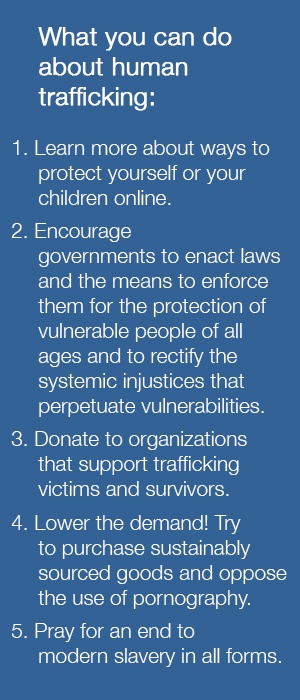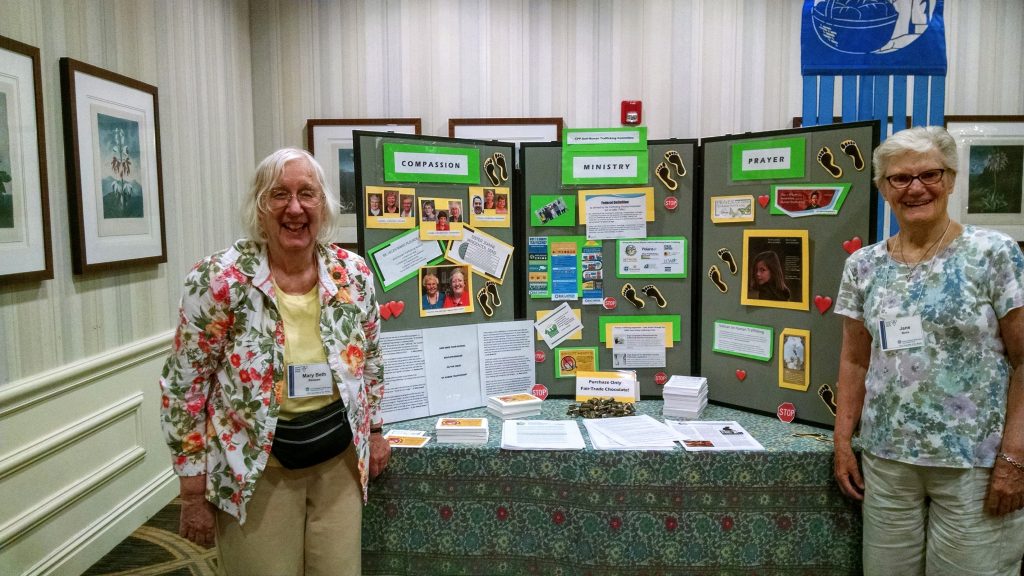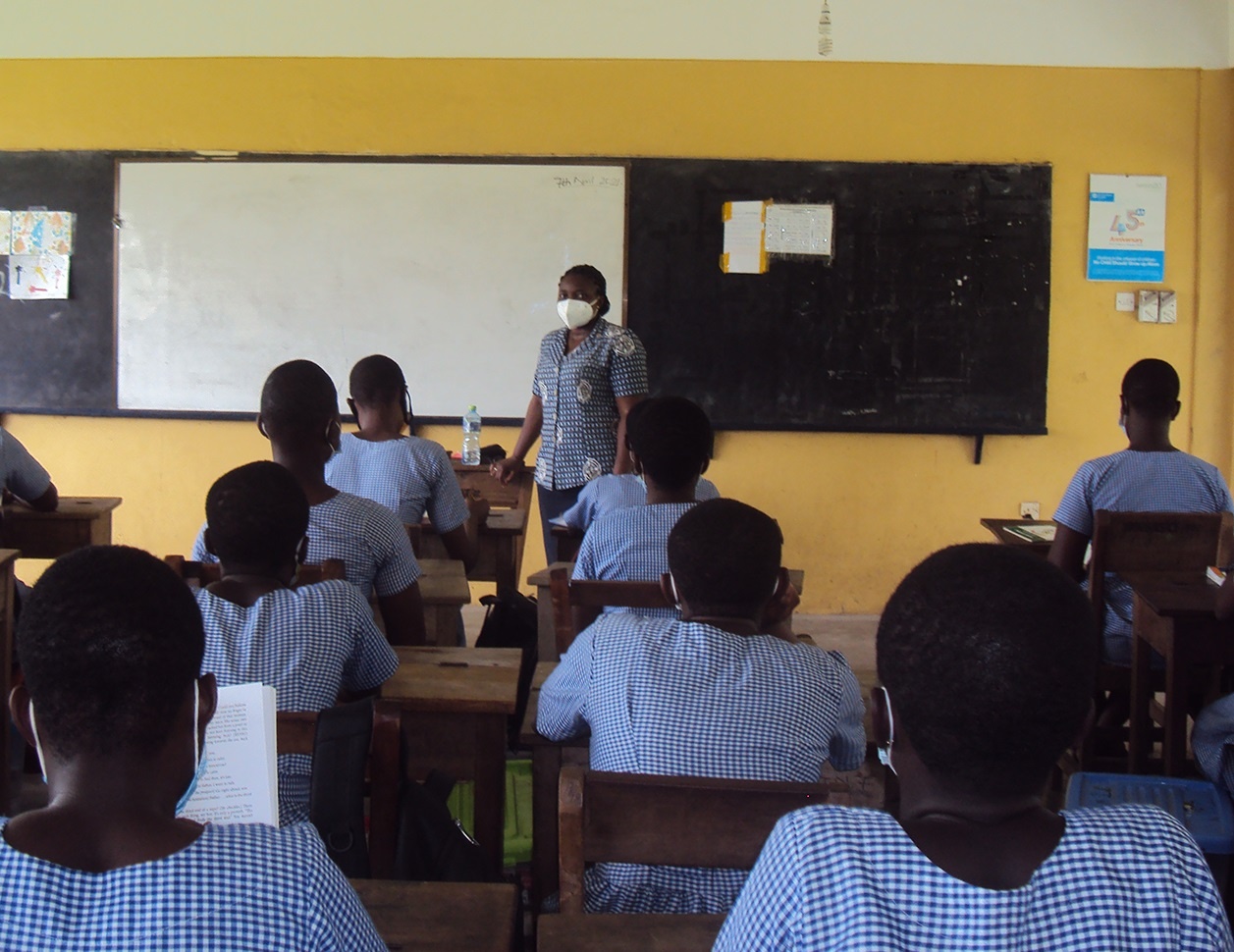Click here for SSND resources on human trafficking
A different kind of epidemic

Effingham sits at the crossroads of two major U.S. interstates in the middle of rural Illinois. For a population of 12,500, there is an overabundance of truck stops, gas stations, restaurants and hotels; a great number of travelers just pass through on a daily basis. There is also a large community of migrant workers providing support for the local farms. The area is highly vulnerable to trafficking of persons, or the buying and selling of human beings for sex or labor. Sister Jane Boos has participated in efforts to educate local community members on the issue.
Sister Jane was born and educated in Effingham, where School Sisters of Notre Dame (SSND) have had a presence since 1874. After her first profession in 1958, she ministered in Missouri and other areas of Illinois, returning to Effingham in 2016.
As a member of the Human Trafficking Committee in the SSND Central Pacific Province since 2017, Sister Jane learned about the critical nature of this modern form of slavery. “At first I wasn’t sure why we were addressing this concern,” she recalled. She quickly realized that she could herself be contributing to people who are labor trafficked – by getting food and clothing at reduced prices, for instance.
She further realized that by learning and raising awareness about human trafficking, “we are reaching out to meet unmet needs in an area, especially with the poor and marginalized – just like Blessed Theresa and Mother Caroline did when they first arrived in the U.S.” Especially now, when “one of the greatest needs during the pandemic is to address human trafficking. Due to increased online activity, people of all ages are being lured over the internet,” said Sister Jane.
Most recently, Sister Jane was a spiritual minister at St. Anthony’s Hospital in Effingham, where she talked with her colleagues about human trafficking. “It’s what people don’t say that might give you a clue,” she said, referring to patients who are actually brought in by their traffickers and aren’t allowed to speak for themselves.
When the pandemic restricted her access to the hospital and patients, in her downtime Sister Jane turned to a book study of Pope Francis’ new encyclical, Fratelli Tutti. “When I prayed Fratelli Tutti, I came to an understanding of what real dialogue is: listening compassionately to what the other person is sharing, the truth they share,” she said. “It is important for all of us to listen to survivors of human trafficking, to get to the cause,” Sister Jane added. “I am grateful to survivors who speak out to make us more aware.”
Recalling the story of the Good Samaritan, Sister Jane reminds us that each of us has each of the characters within us. “We are the often the passersby in the story,” she said. “I live in a small city; it’s common to have blinders on.” But she is doing her part to advocate for victims and survivors of human trafficking through educating herself, sharing knowledge and resources with others, contacting legislators to address the concern, helping survivor organizations with financial support and volunteering.
“Trafficking in persons and other contemporary forms of enslavement are a worldwide problem that needs to be taken seriously by humanity as a whole: ‘since criminal organizations employ global networks to achieve their goals, efforts to eliminate this phenomenon also demand a common and, indeed, a global effort on the part of various sectors of society.’” (Fratelli Tutti 22)
Not a new concern
In 2002, the general superiors of both men and women religious were asked by the Vatican to be involved in alleviating issues around human trafficking.

(Left to right) Sisters Mary Beth Reissen
and Jane Boos, as members of the Human
Trafficking Committee in the Central
Pacific Province, share a display at the
SSND Assembly of the Whole in 2018.
Shortly thereafter, a SSND Human Trafficking Committee was created in the former Canadian province. They spent the first two to three years doing research, education and exploration. Sister Marie Taylor was recruited for the committee because of her work with international students. “The perception was that human trafficking was international and external, that people were trafficked into Canada from Asia or Europe. We were not aware how much was happening domestically,” said Sister Marie. In Canada, there is a big problem with indigenous women being trafficked within the country. When Sister Marie began to discover this reality, she was shocked.
As the committee grew, they formed groups in urban centers, provided support for women and went to workshops for continuing education. The committee organized an annual conference beginning in 2005, engaging SSND Associates. They also offered many workshops and made presentations at the high schools.
As Sisters’ ministries changed, there was turnover on the committee. Eventually there were more lay people than SSND. In 2019, the committee ended its work; members were older now, and other organizations were stepping up to meet the need to educate others about human trafficking, such as Talitha Kum.
“I’m not sure I am against human trafficking as an SSND but as a woman, a Christian; I just want the world to be better,” said Sister Marie. “Everybody has a right to reach their full potential. Our responsibility is not just to reach our potential but to help others to reach it.”
From next door to around the world
Human trafficking is not just an urban or rural issue, but a global concern. Sister Helen Galadima teaches at Notre Dame Girls Senior High School in Sunyani, Ghana. On the side, she educates herself about human trafficking in order to keep her students informed of the possibilities of exploitation and how they can be more confident in avoiding the traps. She has also had opportunities to be the Good Samaritan in some trafficking situations.

At Notre Dame Girls Senior High School in Sunyani, Ghana, Sister Helen Galadima
teaches her students how to keep themselves safe from human traffickers.
“I met a woman, a mother of two children. While we were talking, I noticed tears rolling down her eyes. She mentioned she had left her husband and children for prostitution, was very worried and wanted to go back to them. I encouraged her to return to her family. It was the beginning of a conversion in the woman’s life. There is room for change,” Sister Helen explained.
“I had another experience with a young lady with whom I shared the same flight. Upon landing, she turned to me and asked if I could help her complete her arrival form. She could not speak much English, yet we communicated somehow. I did help her and she asked me again, ‘Do you know this place?’ I did not. I asked, ‘What brought you here?’ She responded, ‘House help.’ Immediately I realized that she was lost and did not know anyone there. I requested a security officer to help and guard her. As I left her and even until now, I could not stop thinking about her and pray for her,” shared Sister Helen.
“Some of the trafficker’s tactics are promises of good jobs, inflated wages, schooling abroad and many others. They come around the town and villages to deceive the people by putting before them the best of life and, in the end, it turns to something different,” Sister Helen warns her students.
“I acknowledge the fact that human trafficking exists in our society in varied ways and it occurs right next door. So we need to know about it and educate ourselves. I educate others where I live and work on the idea of love and respect of neighbor. This is such a fundamental thing that when it is lacking, it pushes individuals to all sorts of wickedness and selfish interests,” explains Sister Helen. “Pope Francis has called us through the encyclical Fratelli Tutti to be our brothers’ and sisters’ keepers, to love and share in the common good. It is time for us to rise up to help in combating human trafficking.”
For SSND resources on human trafficking, including a printable prayer card, visit ssnd.org/shalom/areas-of-concern/human-trafficking.
